

Alzheimer Hot Line
1-800-272-3900
Open 24 Hours a Day
OAN’S BLOG – MONDAY, JUNE 9, 2008 – MUSIC TO ENHANCE LANGUAGE AND MEMORY – From the Conference – Part II
The weekend blog (see below) related to those spouses in the earlier stages of AD, as did the one on the FAQ notebook (scroll down below). I try to vary my Blogs so that there is always one that relates to whatever stage my readers are dealing with. Although the focus of the Music Therapy session I attended on Thursday, related to later stage patients with limited verbal skills and memory, I thought it could be useful for enhancing conversation and memory in any stage.
session I attended on Thursday, related to later stage patients with limited verbal skills and memory, I thought it could be useful for enhancing conversation and memory in any stage.
The workshop was presented by Thomas A. Dalton, Licensed Mental Health counselor and Board certified Music Therapist. He was, of course, advocating that nursing homes and Day Care Centers use the services of a licensed musical therapist, and I am not disputing that in any way. My purpose is simply to pass along some fun activities that you and your spouse may enjoy that will stimulate memory and language. There is a lot of scientific knowledge related to right/brain; left/brain function  as to why music is beneficial to Alzheimer patients, which I will not get into here. Click these links if you are interested in exploring the scientific aspect:
as to why music is beneficial to Alzheimer patients, which I will not get into here. Click these links if you are interested in exploring the scientific aspect:
One of the rules of communicating with a person with AD is NOT to say, “Do you remember …………..?” Music therapy suggests stimulating the memory in two ways. You can simply hold hands, and put on a CD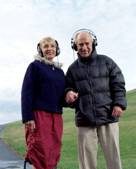 of music that you both loved, listened to, and danced to, when you were dating. The spouse who has not lost all of their communicative skills may recall and talk about a particular event you attended while enjoying that music (Woodstock, anyone?
of music that you both loved, listened to, and danced to, when you were dating. The spouse who has not lost all of their communicative skills may recall and talk about a particular event you attended while enjoying that music (Woodstock, anyone?  ). The spouse with little verbal ability may sing a few words or just hum along with the music. I know a woman whose husband is failing quickly, cannot remember that his children are his children, cannot cut his own food, but he remembers how to dance. When his wife puts on the music and holds out her arms, he goes right to her and remembers those dance steps
). The spouse with little verbal ability may sing a few words or just hum along with the music. I know a woman whose husband is failing quickly, cannot remember that his children are his children, cannot cut his own food, but he remembers how to dance. When his wife puts on the music and holds out her arms, he goes right to her and remembers those dance steps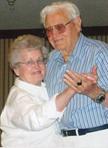 ! Sid cannot remember what someone said to him 5 minutes ago, but at the Beach Boy
! Sid cannot remember what someone said to him 5 minutes ago, but at the Beach Boy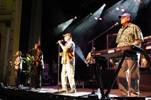 Concert in March, he was singing along the words to every one of those songs, as was Charlie, who was sitting on the other side of me. (I can’t remember more than a few words to ANY song, sung by ANY musical artist.) After the singing, your spouse MAY talk and share memories with you of that time. And isn’t the loss of the ability to share memories, one of the aspects of AD that hurts us so much? If music can bring that back for you and your spouse, even for an hour, wouldn’t that be emotionally satisfying?
Concert in March, he was singing along the words to every one of those songs, as was Charlie, who was sitting on the other side of me. (I can’t remember more than a few words to ANY song, sung by ANY musical artist.) After the singing, your spouse MAY talk and share memories with you of that time. And isn’t the loss of the ability to share memories, one of the aspects of AD that hurts us so much? If music can bring that back for you and your spouse, even for an hour, wouldn’t that be emotionally satisfying?
The second method of eliciting memory and language is songwriting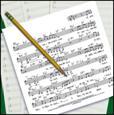 . Again, I would be remiss if I did not remind you that this was done by a certified music therapist, but what the heck, we can have fun with it if we choose, can’t we? (Well, not me – I have no musical ability, but I’ll bet some of you do!) What the therapist did was interview the family about their loved one’s background – childhood home
. Again, I would be remiss if I did not remind you that this was done by a certified music therapist, but what the heck, we can have fun with it if we choose, can’t we? (Well, not me – I have no musical ability, but I’ll bet some of you do!) What the therapist did was interview the family about their loved one’s background – childhood home ; military service
; military service ; siblings. Then he would gently ask the patient about, for example, living on a farm as a child. More often than not, the AD patient would recall an incident, an image, some memory from that time, and the therapist would pluck his guitar
; siblings. Then he would gently ask the patient about, for example, living on a farm as a child. More often than not, the AD patient would recall an incident, an image, some memory from that time, and the therapist would pluck his guitar and sing about the incident. And wouldn’t you know it – the patient would sing along
and sing about the incident. And wouldn’t you know it – the patient would sing along , talk a little, remember a little, laugh, and just enjoy the whole process. The therapist would return to his office, write a song based upon the person’s history, put it onto a CD, present it to the family, who could then enjoy it with their loved one. We do not have to get that elaborate, but just the talking, singing, and reminiscing would, I think, be a wonderful, warm, nurturing activity for spouses to do together.
, talk a little, remember a little, laugh, and just enjoy the whole process. The therapist would return to his office, write a song based upon the person’s history, put it onto a CD, present it to the family, who could then enjoy it with their loved one. We do not have to get that elaborate, but just the talking, singing, and reminiscing would, I think, be a wonderful, warm, nurturing activity for spouses to do together.
Sid is 6 years older than me, which is just enough to put us in different “musical eras”. He loves the late 1950’s “doo wop” 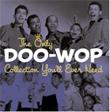 music. He was 16-18 years old at that time. I was 10, so it wasn’t exactly my prom music. However, I have noticed that when he listens to that music – usually on PBS specials – he will recall the car
music. He was 16-18 years old at that time. I was 10, so it wasn’t exactly my prom music. However, I have noticed that when he listens to that music – usually on PBS specials – he will recall the car he was driving at the time; the girls he was dating; the teachers he had; the lessons his father was trying to teach him about girls (I’m not elaborating on that one). He is more communicative and clear in his meaning and intent when listening to that music than at any other time.
he was driving at the time; the girls he was dating; the teachers he had; the lessons his father was trying to teach him about girls (I’m not elaborating on that one). He is more communicative and clear in his meaning and intent when listening to that music than at any other time.
If you have a guitar to strum, a piano to play, a CD to listen to, why not give it a try? You may be surprised at the results.
Feedback to joan@thealzheimerspouse.com
The material included on this website contains general information intended as information only. This site is not intended to provide personal, professional, medical, or psychological advice, and should not be relied upon to govern behavior in any certain or particular circumstances. The opinions in the blogs are solely those of the owner of the website. The opinions on the message boards are not necessarily endorsed by the owner of this website, and are the opinions of those persons writing the messages. All material on this web site is for demonstration and informational purposes only.
The Alzheimer Spouse LLC 2009 All Rights Reserved

Custom Search
|



























